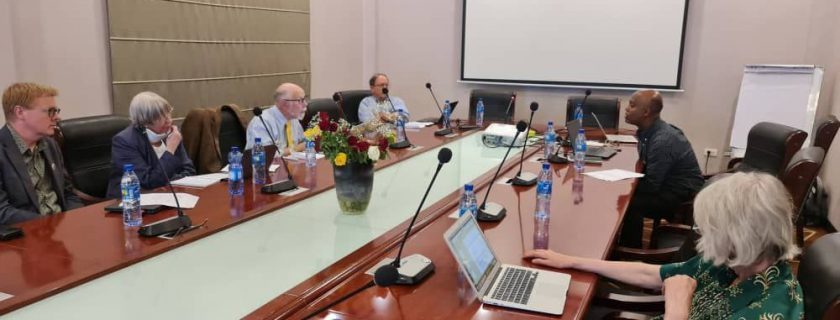The 2021/2022 AHRI SAB meeting was successfully held from June 13 to 17, 2022. The SAB members, after intensive review of the state of affairs of AHRI, reached at a conclusion that “profound accomplishments have been made by AHRI in the midst of diverse challenges within the past two years.”
Exemplary accomplishments pinpointed included:
- Development of an in-house COVID-19 serology kit and its accreditation by EFDA;
- contributions in the WHO Solidarity Trial;
- Building capacity on next generation sequencing and using the technology to identify strains of SARS coronavirus-2 circulating in Ethiopia;
- Clinical drug trail on MDR TB, multi-country genetic sequencing of human adapted TB, studies on immunological signatures during development of latent TB to active TB;
- Provision of advanced laboratory services on TB/MDR TB, pathology including immuno-histochemistry, COVID-19 PCR, and HLA-typing;
- Involvement in vaccines for Africa initiative led by Africa CDC and setting the foundations for vaccine R&D;
- Global contribution on malaria control via high impact research on the vector, drug resistance and gene mutations;
- Research on oral cholera vaccine clinical trials to contribute to WHO’s 2030 goal to eradicate cholera;
- Bubble continuous positive airway pressure (CPAP) trial to improve child pneumonia survival;
- Accreditation of training modules on Good Clinical Laboratory Practice, Advanced Molecular Biology, and Laboratory Safety & Bio-risk Management;
- Research Training of 74 postgraduate students (PhD & MSC) from 23 different institutions;
- International collaboration with various institutions including the establishment of AHRI-IVI collaborating center on vaccine R&D; and many others.
Major comments for future improvement included:
- Setting the tone on the biggest mission of AHRI that is as a clinical and biomedical research and development institute.
- Establishing diverse platforms and face to face meetings including Inter-directorate, intra-directorate, and supervisor-student meetings, etc.
- Transparency, trust and aggressive communication to improved internal and external communication, the need for e-newsletter, the need for writing center, technology based communication, etc.
- The importance of longitudinal view to research: making researches and projects future oriented and linked with impacts.
- Appreciating the bigger picture and global presence of AHRI as AHRI is rising to an entirely different level and its activities are part of the bigger global initiatives (e.g. COVID clinical trials, MDR TB trials, Cholera vaccine, malaria, one health, African vaccine initiative, etc.)
- The need for delegation with responsibility and accountability: delegation of various activities to the second and third tiers of the institute so that the upper strata can engage on strategic issues, etc.
- Flexible human resource management and development: innovative approaches on incentives and staff retention mechanisms, etc.
AHRI thanks our SAB members (Prof. Tsige Gebre-Mariam (AAU, Addis Ababa, Ethiopia, Chairman of SAB), Prof. Gunnar A. Bjune (UiO, Oslo, Norway), Prof. John Clemens (IVI, Seoul, Korea), Prof. Hazel Dockrell(LSHTM, London, UK) , Dr. Kurt Hanevik(UiB, Bergen, Norway),Prof. Dianna Lockwood (LSHTM, London, UK)and Prof. Björn Andersson (KI, Stockholm, Sweden)) for their deeper look into AHRI’s state of affairs and for the very important comments and suggestions which will help a lot in AHRI’s next moves.
We would like to call upon researchers, research & higher education institutions, and all stakeholders to join hands with AHRI so that we all can synergistically contribute to global health at the highest level.
